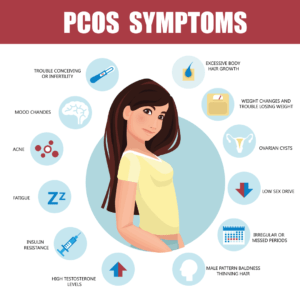PCOD and PCOS – How are they different? | Causes, Symptoms and Treatment
 40530
40530

PCOD (Polycystic Ovarian Disease) and PCOS (Polycystic Ovarian Syndrome) are hormonal disorders that have taken over the lives of many women by storm. These ailments affect approximately 5% to 10% of women in India, who fall in the age group of 12 to 46 years. Both these ailments are caused due to hormonal
imbalances in a woman and cause complications with menstruation making it difficult for a woman to conceive.
PCOD and PCOS – Are they the Same?
Most women use PCOS (Poly Cystic Ovarian Syndrome) and PCOD (Poly Cystic Ovarian Disease) interchangeably; however, both are different conditions. While both these conditions are associated with the ovaries and cause hormonal disturbances and have similar symptoms and treatments, there are many differences between the two.
PCOD is a disorder in which the ovaries contain many partially mature or immature eggs. These eggs eventually turn into cysts. This condition usually affects women in the reproductive age group.
PCOS is a metabolic condition that is more severe than PCOD. Here, the ovaries produce an increased quantity of the male hormone, leading to the development of more than ten follicular cysts in the ovary each month. This stops the release of eggs from the ovaries that leads to ovulation.

Difference Between PCOD and PCOS
- PCOS is a severe metabolic disorder, whereas PCOD is not considered a disease as it can quickly resolve with the proper diet and exercise.
- PCOD is more common.
- PCOS can have serious complications such as the risk of developing diabetes, high blood pressure, obesity, cardiac-vascular issues, and endometrial cancer.
- PCOS is visible early, and girls start showing symptoms right from their teenage years – excessive hair growth, acne, and weight gain, to name a few.
- PCOD does not lead to significant fertility issues in women, and these women can easily conceive with some medical assistance. PCOS leads to important fertility issues and higher rates of miscarriages.
- PCOD does not interfere with one’s ovulation process, whereas women suffering from PCOS do not ovulate due to an extreme hormonal imbalance.
Also Read: 10 Tips of Conception if your trying to get Pregnant
Causes and Symptoms of PCOD and PCOS
Although PCOD and PCOS causes are not understood completely, certain factors increase the risk of these ailments, such as:
- Insulin Resistance – Once cells turn resistant to insulin, the pancreas produces more insulin to avoid increased blood sugar levels. High insulin levels could increase androgen (the male hormone) production, which affects the ovulation cycle.
- Inflammation – Inflammation levels tend to increase with PCOD. Low-grade inflammation also associated with obesity studies indicates a link between elevated androgen levels and excess inflammation.
- Heredity – Both PCOS and PCOD are ailments connected to genes and could run in some families.
Very often, there are no visible symptoms with PCOD, and some studies indicate that almost 70 percent of women may not even know that they are suffering from PCOD. Most women get to see that they have this ailment only after they struggle to conceive. It is extremely crucial to identify these disorders and start treatment as early as possible.
Some of the most common symptoms of PCOD and PCOS include:
- High androgen levels prevent ovulation, which in turn prevents the uterine lining from shedding. This leads to irregular periods or heavy bleeding.
- Most women experience more hair growth on their backs and faces.
- As male hormones increase sebum production, acne outbreaks and male pattern balding are common symptoms.
- Eighty percent of women with PCOD suffer from obesity or excess body weight.
- Skin darkening is another symptom in areas with skin folds, such as in the armpits, neck, groin, and under the breasts.
- Some women may also suffer from extreme and severe headaches.
- Mood swings are common due to hormonal imbalance.
Treatment of PCOD and PCOS
Diet and lifestyle changes are the main aspects of PCOD and PCOS treatment. These lifestyle changes are essential to overcome PCOD and PCOS, as studies show that weight reduction can improve treatment outcomes, reduce the severity of symptoms, and improve the efficacy of medications.
Treatment of PCOD and PCOS with medications focuses on specific symptoms, such as infertility, or an underlying cause, such as insulin resistance. Some of the most common treatments are:
- Medications to improve insulin levels, reduce resistance, and treat type 2 diabetes can help resolve other PCOD symptoms.
- A combination of birth control pills and progestin therapy may be used to improve menstrual abnormalities and control hormonal levels.
- Hormonal medications may be used to aid the ovaries for the ovulation process.
- Medicines to block androgen effects on skin can be advised to decrease hair growth.
Also Read: Pregnancy Anxiety: Know how to overcome it !
PCOD/PCOS and Pregnancy
PCOD and PCOS do not make conception impossible but more challenging. Roughly 70 percent of women suffering from these ailments experience fertility-related issues. There is also an increased risk of pregnancy complications, such as premature deliveries, miscarriages, gestational diabetes, and hypertension.
Blood sugar level management, weight loss, and fertility treatments can improve the chances of conceiving.
PCOD and PCOS Complications
Hormonal imbalances can increase the risk of various health conditions, such as:
- Infertility – a result of irregular ovulation.
- Metabolic syndrome disorders such as hypertension, diabetes, and heart diseases.
- Abnormal ovulation can lead to thickening of the uterine lining, elevating the risk of endometrial cancer.
- Women with PCOD face increased risks of anxiety disorders and clinical depression.
FAQs Related to PCOD and PCOS
- Any difference between polycystic ovaries and PCOS?
PCO refers to an ultrasound scan image of the ovaries that appear polycystic (ovaries containing a high density of partially mature follicles). PCOS is a metabolic disorder that may or may not come with having polycystic ovaries.
PCO is a normal variation of a woman’s ovary, whereas PCOS is a diagnosed disorder with short or long-term consequences.
- Is PCOD serious?
PCOD is not life-threatening, but it can lead to various complications that could be serious if treatment is not provided promptly.
- Can PCOD or PCOS be cured permanently?
Both these ailments are chronic lifestyle disorders that cannot be treated with medication. However, lifestyle changes and medical treatment and can reduce their effect on the quality of life.
- Can PCOS be sexually transmitted?
PCOS is a hormonal condition, and it is not caused due to an infection. This means that it cannot be sexually transmitted and is not contagious.
- Can I get pregnant with PCOS or PCOD?
There is a risk of infertility, but pregnancy is not impossible. The prospects of conception can also be increased with fertility treatments and weight loss.
The content has been checked and developed under the supervision of our expert Dr.Priyanka Yadav..Masters of physiotherapy in obstetrics and gynecology. Worked in Sanjeevani hospital in hoshangabad
Insta profile: make_pregnancy_easy,cherry_and_mom and PhysioPlanet
Follow us-
Instagram/ Facebook/ Youtube/ Pinterest
Also Read:
The How, What, When- Everything you Should Know about Ovulation
Hair, There Everywhere – Post Pregnancy Hair Loss Home Remedies





Leave a Reply